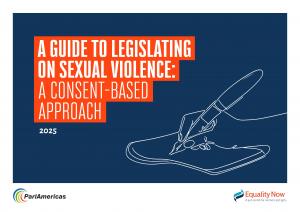Urgent Call to Reform Outdated Sexual Violence Laws in Latin America and the Caribbean
Outdated sexual violence laws in Latin America and the Caribbean are failing survivors. A new guide urges consent-based reforms to strengthen legal protections.
BOGOTA, COLOMBIA, April 11, 2025 /EINPresswire.com/ -- Across Latin America and the Caribbean, sexual violence remains one of the most pervasive forms of gender inequality, with outdated and sex-discriminatory legal frameworks failing to provide effective protection for victims. A new guide by Equality Now and ParlAmericas provides a comprehensive framework for legislating on sexual violence to help ensure national laws align with international human rights standards.LEGAL GAPS AND OUTDATED RAPE LAWS LEAVE SURVIVORS UNPROTECTED
Research by Equality Now found that 23 of the 43 national and subnational jurisdictions surveyed in Latin America and the Caribbean define rape based on the use of force, threats, or the victim’s physical inability to resist rather than the absence of voluntary and free consent. These outdated definitions fail to reflect the realities of sexual violence, particularly in cases where power imbalances, coercion, or vulnerability prevent victims from physically resisting or saying no.
Produced by legal experts, ‘The Guide to Legislating on Sexual Violence’ underscores the urgent need to shift away from legal definitions of sexual violence that require proof that force was used, as this can perpetuate harmful myths and stereotypes and limit the scope for accountability for rape.
The embeddedness of these myths and stereotypes within many regional legal frameworks and judicial practices perpetuates the normalization of sexual violence and shifts blame onto survivors instead of establishing the culpability of perpetrators. As a result, survivors frequently face legal obstacles that discourage reporting, create ambiguity in court proceedings, and contribute to low conviction rates—ultimately undermining trust in justice systems.
To address these issues, laws and policies should instead adopt a consent-based approach that strengthens protections for survivors, improves access to justice, and holds perpetrators accountable.
THE NEED FOR CONSENT-BASED LEGAL DEFINITIONS
International human rights standards require that legal definitions of rape and other forms of sexual violence be based on the lack of voluntary and free consent. Discriminatory definitions of sexual violence, when not premised on a strong understanding of consent, can discourage survivors from reporting and create a lack of clarity for court proceedings.
Force-based legal definitions of rape perpetuate the myth that it is the responsibility of victims to protect themselves and fail to take into account how victims may remain passive or freeze. Nor do they generally recognize the broad range of coercive situations where rape can happen without the use of physical violence or force, such as when the perpetrator exploits unequal power dynamics, trust, influence, and/or the victim’s dependence on them.
Survivors may delay reporting sexual violence due to social stigma, fear of retaliation, or lack of family support. It can be difficult to provide physical or medical evidence at a later date to prove additional violence was involved. Such a burden of proof on the survivor hinders the legal process by making it harder to prosecute cases.
RECOMMENDATIONS TO REFORM SEXUAL VIOLENCE LAWS
To increase access to justice for survivors in Latin America and the Caribbean, it is crucial to close all legal gaps relating to consent in sexual violence laws. The guide provides legislative recommendations that call for adding the lack of consent as the central element of rape and crimes of sexual violence. This covers all forms of unwanted penetration of a sexual nature, regardless of the object or body part used.
The publication outlines how penal codes must comprehensively recognize the contexts and coercive circumstances where consent can neither be freely given nor inferred. Legal frameworks must address sexual violence in situations involving power imbalances and within families, eliminating any provisions that exempt rape committed within marriage or intimate relationships.
The guide also calls for the abolition of discriminatory legal provisions such as estupro, which applies when the alleged perpetrator is an adult and the victim is above the legal age of consent but under 18. This provision carries significantly lower penalties than those established for rape, creating a discriminatory gap in the protection of adolescent girls.
Beyond criminalization, legislative reforms must be survivor-centered and developed in consultation with survivors and civil society organizations. A participatory approach strengthens legal frameworks, ensuring they are responsive to the lived realities of survivors and provide the necessary mechanisms for them to seek justice and other support if desired.
By adopting a consent-based approach, parliamentarians have the opportunity to dismantle outdated legal definitions rooted in force, eliminate myths and stereotypes that hinder justice, and align national laws with international human rights obligations. The guide equips lawmakers with the tools to build a more just and equitable legal system that upholds survivors’ rights and hold perpetrators of sexual violence accountable.
****************************************************************************
About Equality Now: Founded in 1992, Equality Now is an international human rights organization dedicated to protecting and promoting the rights of all women and girls worldwide. Its work is organized around four main program areas: Achieving Legal Equality, Ending Sexual Violence, Ending Harmful Practices, and Ending Sexual Exploitation, with a cross-cutting focus on addressing the unique challenges faced by adolescent girls.
Equality Now combines grassroots activism with legal advocacy at the international, regional, and national levels to achieve systemic change, and collaborates with local partners to ensure governments enact and enforce laws and policies that uphold women’s and girls’ rights.
For more details go to www.equalitynow.org
About ParlAmericas: ParlAmericas is the institution that promotes parliamentary diplomacy in the inter-American system. Composed of the 35 national legislatures of North, Central, and South America, and the Caribbean, it promotes cooperative political dialogue, facilitates the exchange of good legislative practices, and develops resources to support the work of parliamentarians.
ParlAmericas works towards democratic strengthening and the promotion and protection of human rights, addressing hemispheric priorities. It promotes gender equality in the parliamentary sphere, advocating for the application of a gender perspective and an intersectional approach in parliamentary work. Led by and for parliamentarians, ParlAmericas is governed by a Board of Directors of parliamentarians who serve as executive members and sub-regional representatives and are appointed by member parliaments. The International Secretariat of ParlAmericas is based in Ottawa, Canada.
For more details go to www.ParlAmericas.org
Tamara Rusansky
Equality Now
+55 21 99966-3828
email us here
Visit us on social media:
Facebook
X
LinkedIn
Instagram
YouTube
Legal Disclaimer:
EIN Presswire provides this news content "as is" without warranty of any kind. We do not accept any responsibility or liability for the accuracy, content, images, videos, licenses, completeness, legality, or reliability of the information contained in this article. If you have any complaints or copyright issues related to this article, kindly contact the author above.
Pilates Equipment and Gears Market 2025 Trends: Expected to Grow at a CAGR of 10.5% from 2022 to 2031, Claims AMR
Associated Scaffolding Announces Multiple Job Openings Across the Southeast
Intelligent Evacuation System Market Reach USD 1.15 Billion by 2030 Globally
Więcej ważnych informacji
 Jedynka Newserii
Jedynka Newserii

 Jedynka Newserii
Jedynka Newserii

Prawo

Kolejne polskie miasta chcą być przyjazne dzieciom. Planują stworzyć najmłodszym dobre warunki do rozwoju
Cztery miasta w Polsce posiadają tytuł Miasta Przyjaznego Dzieciom nadany przez UNICEF Polska. Dziewięć kolejnych miast czeka na certyfikację, a w ostatnich miesiącach do programu zgłosiło się kilka następnych. Na całym świecie inicjatywa została przyjęta już w ponad 4 tys. samorządów, a w Hiszpanii objęła połowę dziecięcej populacji miast. Program UNICEF-u ma na celu zachęcenie włodarzy do traktowania najmłodszych obywateli w sposób podmiotowy, respektowania ich praw i zaproszenia ich do współdecydowania o przyszłości.
Przemysł
W ciągu roku w Polsce ubyło 500 przedsiębiorstw odzieżowo-tekstylnych. Problemem są spadki zamówień z Europy Zachodniej i wzrost kosztów

Wartość rynku odzieżowego w Polsce wynosi 66,9 mld zł, z czego 10 mld zł to wartość krajowej produkcji – wynika z danych PIOT. Od czasu pandemii branża mierzy się z szeregiem wyzwań, wśród których najpoważniejsze to wzrost kosztów pracy i produkcji, przerwane łańcuchy dostaw i spadek zamówień – zarówno w kraju, jak i za granicą, a także wzrost nieuczciwej konkurencji na rynku, czyli głównie importu z Chin. Skala wyzwań sprawia, że w ubiegłym roku z rynku zniknęło 500 firm. Producenci odzieży apelują do rządu o wsparcie.
Handel
D. Obajtek: Orlen powinien być o 30–40 proc. większą spółką. Byłoby to z korzyścią dla konsumentów

Orlen jest największym polskim przedsiębiorstwem. Jego przychody ze sprzedaży w 2024 roku wyniosły blisko 295 mln zł, a rok wcześniej – ponad 372 mln – wynika z raportu Rzeczpospolitej „Lista 500”. W ubiegłorocznym rankingu Fortune 500 uwzględniającym największe korporacje znalazł się na 216. miejscu na świecie i 44. w Europie. Według Daniela Obajtka, europosła PiS-u i byłego prezesa Orlenu, spółka powinna jeszcze urosnąć, tym samym gwarantując konsumentom szereg korzyści, a także przyspieszać inwestycje m.in. w obszarze petrochemii i energetyki zero- oraz niskoemisyjnej.
Partner serwisu
Szkolenia

Akademia Newserii
Akademia Newserii to projekt, w ramach którego najlepsi polscy dziennikarze biznesowi, giełdowi oraz lifestylowi, a także szkoleniowcy z wieloletnim doświadczeniem dzielą się swoją wiedzą nt. pracy z mediami.









.gif)

 |
| |
| |
|